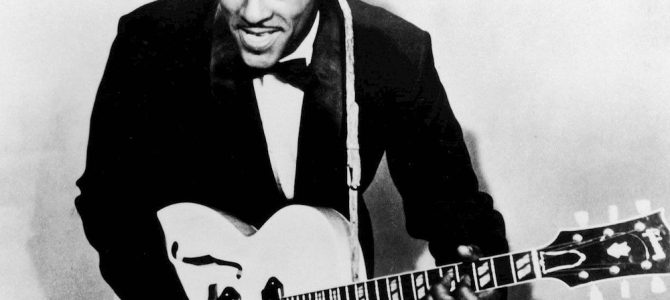
My first memory of Chuck Berry came from the movie “Back to the Future.” In a famous scene at the Enchantment Under the Sea dance, Michael J. Fox’s character, Marty McFly, is pressed into playing guitar for the band and teaches them “Johnny B. Good.” The injured guitarist, Marvin Berry, calls his brother Chuck, and lets him hear the amazing sound over the phone. It’s a cute joke that has been ubiquitous on social media since Berry’s death. But it is also one that is loaded in 2017 in ways that it was not in 1985, when ‘Back to the Future’ premiered.
https://www.youtube.com/watch?time_continue=92&v=cCRBPv13GMw
What didn’t exist in the popular consciousness in 1985, but does now, is the concept of Cultural Appropriation. The concept argues that members of a dominant culture should not take the cultural products of a non-dominant culture and attempt to make them their own. Greg Tate’s 2003 book, “Everything but the Burden,” helped to popularize the concept, which had bubbled in academia throughout the 1990s.
Rock and Roll, as it turns out, is a popular example used by those who argue against cultural appropriation. In this 2014 Salon article, “Elvis Wasn’t the First to Steal Black Music: 10 White Artists who ‘Borrowed’ from R & B Before the King,” we’re told that black artists invented Rock and Roll, and it was stolen by white artists such as Elvis Presley.
Rock And Roll Has A Complex Cultural Story
This makes the “Back to the Future” joke somewhat more sinister today: white people didn’t steal Rock and Roll, they travelled back in time to teach it to black people. But while it is true that black artists, especially blues guitarists, had an outsized influence on Rock and Roll—one that was not sufficiently compensated or celebrated—the real story is, not surprisingly, more complex. And perhaps no artists’ work tells that complex story of cultural mixology better than Chuck Berry’s.
Chuck Berry’s first big hit was “Maybelline,” with legendary Chess Records in 1955. Chess was looking for a new sound, something fresh that didn’t sound like traditional black Rhythm and Blues. What Berry brought them was a guitar-driven version of a country song, “Ida Ray.” The country sound, favored by white artists, was taken from a fiddle tune. It balanced the blues elements, making them lighter, airier, and more flexible. Some believe that in “Maybelline,” and then the next year with “Roll Over Beethoven,” also rooted in a country sound, Chuck Berry invented rock guitar.
It’s hard to imagine the world before a guitar and hella good hair were the signature of music icons. But in 1955, the electric guitar was just starting to overtake horns as the dominant soloing instrument. Not only did it possess enough musical dexterity to command the spotlight, the guitar gave performers like Berry the freedom to express themselves physically, as Berry would do famously by duck walking across the stage.
How Chuck Berry Took The Musical World By Storm
But if Berry took liberally and wisely from the musical traditions of different American cultures, he also paid it forward by bringing his astounding new sound across the Atlantic. A whole generation of British guitarists and songwriters would use his style to plot their invasion of the United States. The Rolling Stones, The Beatles, The Kinks, and many others drew direct inspiration from the sound that Berry had invented. Even after his success and fame, Stones guitarist Keith Richards can be seen on film, learning at the knee of his mentor.
Some great artists live so long that their deaths are not milestone, but natural events. Last year’s deaths of Prince and David Bowie at relatively young ages came as a shock in a way Berry’s did not. At 90, not only was his death certain to come soon, he was also several decades removed from his active music career. Most people alive today only know his music as “oldies.”
But even though his songs now summon images of the distant past, like hot rods and poodle skirts, as a principle inventor of Rock and Roll, Berry created something that remains alive, fresh, and powerful. There is a point at which a phenomenon becomes so huge, so global, it defies any specific cultural identity. Concepts like democracy and games like chess operate in this way: they are no longer Greek or Indian, they are universal. Such is the case with Rock and Roll.
Berry Created Music That Transcends Culture
This is why overzealous complaints about cultural appropriation are ultimately self-defeating. For a cultural phenomenon to fully blossom and flourish, it must pass through many hands. Attempts to keep cultural output pure and proprietary deny that output the ability to reach its potential. The dominant culture in American society is made of myriad influences—for the very reason that it takes from all.
In helping to invent Rock and Roll, Chuck Berry did not just create a great symbol of America. He created a great art form of the world. And he did it by taking what he needed musically, regardless of the demographics of its creators. He took advantage of the good in both Blues and Country. In so doing, he created a musical lingua franca—a style of music that is not only enjoyed, but also created in almost every culture on Earth.
Viewed in this way, Marty McFly choosing Chuck Berry’s “Johnnie B. Good” as the seminal example of 1950’s rock is a great and deserved compliment. After all, the real joke is that Marty invents Rock and Roll—a new sound so vital and compelling that it stuns the crowd and becomes arguably the most popular form of music in the world. “Back to the Future” is just a movie. Chuck Berry was real. With an open ear and an open mind, he helped to create an art form that is, above all, human.









